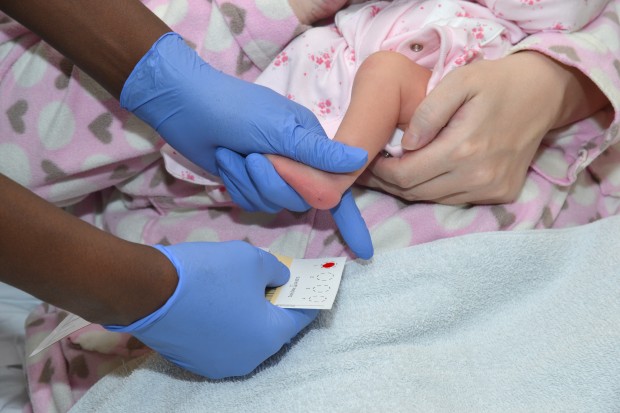
The newborn blood spot failsafe solution (NBSFS) is an IT system used by all maternity services in England. It makes sure that no baby born in England misses the offer of newborn blood spot screening for 9 rare but serious conditions.
In this blog article, I explain the new process for managing the NBSFS records of babies who are born in England but live in Wales, or have newborn blood spot (NBS) screening tests carried out in Wales.
More than 1,000 babies a year born in England have some element of the NBS screening pathway shared with Wales.
We work closely with our Welsh colleagues and both countries screen for the same 9 newborn blood spot conditions in line with UK National Screening Committee recommendations.
However both countries have their own IT systems and there are often queries about records for English babies who live in Wales or were screened in Wales. Common queries include the following:
I have a record stuck on my tracking page, for a baby who has been screened in Wales.
A record has flagged up for a baby who was born at our hospital but the mother and baby went back to Wales where they live.
From now on, there is a simple 2-step process for both types of query:
- Add an entry in the notes section.
- Transfer the record to the newborn blood spot failsafe Wales site.
How it works in more detail
Further information about what you need to do:
- Add a note on the baby’s NBSFS record stating the reason for the transfer. For example, ‘We think this baby has been screened in Wales’ or ‘Mother and baby live in Wales’. Add any further relevant information and please make sure the Wales address is recorded for Wales residents.
- Transfer the record to the ‘Wales_WAL’ site on the drop down list.
- Colleagues who use the failsafe system in Wales will accept the record. If the baby is resident in Wales they will continue the follow-up until screening is complete.
- If the baby is resident in England, they will write the screening results in the ‘notes’ section and mark the record as ‘repeat required’, or ‘received’ if screening is complete, and transfer the record back to your failsafe site. When babies have a positive screening result, the Wales newborn screening laboratory will communicate the result with the relevant providers, as they do now. The screening team in Wales will check this has happened before transferring the record back to you.
- Records in ‘repeat’ status will flag on your tracking page so that you can continue to follow up. Records in ‘received’ status will not flag up but you can find them using the search functions if you wish.
You can contact the relevant newborn blood spot Wales administration failsafe team with any record queries:
- North Wales: 01978 727005
- Mid and West Wales: 01656 754085
- South East Wales: 029 2074 3568
This process replaces the one in the current NBSFS user guide, which will be updated as soon as possible. A copy of the new process is available if you click the ‘useful information’ button on the NBSFS tracking page or from the NBSFS helpdesk.
Carla Malpeli is the screening co-ordinator for the Countess of Chester Hospital, on the border with Wales. She says:
Over a quarter of mothers and babies in my care either live in Wales or have their blood spots tested in Wales. I find the failsafe system invaluable in keeping track of screening and reassuring me that none of my babies have been missed. This new process will make managing their records even easier.
In a separate development, Wales now identifies all babies with an English address who are born in Wales and adds them to the NBSFS. Previously, they could only add those with incomplete screening who flagged on the Welsh system.
We would like to thank newborn screening manager Jacqui Evans and her team at newborn blood spot Wales for the work they have put into developing these and other failsafe processes and for their continuing support.
Please contact NBSFS project lead Julie Wilcox at julie.wilcox2@nhs.net if you have any questions.
PHE Screening blogs
PHE Screening blogs provide up to date news from all NHS screening programmes. You can register to receive updates direct to your inbox, so there’s no need to keep checking for new blogs.